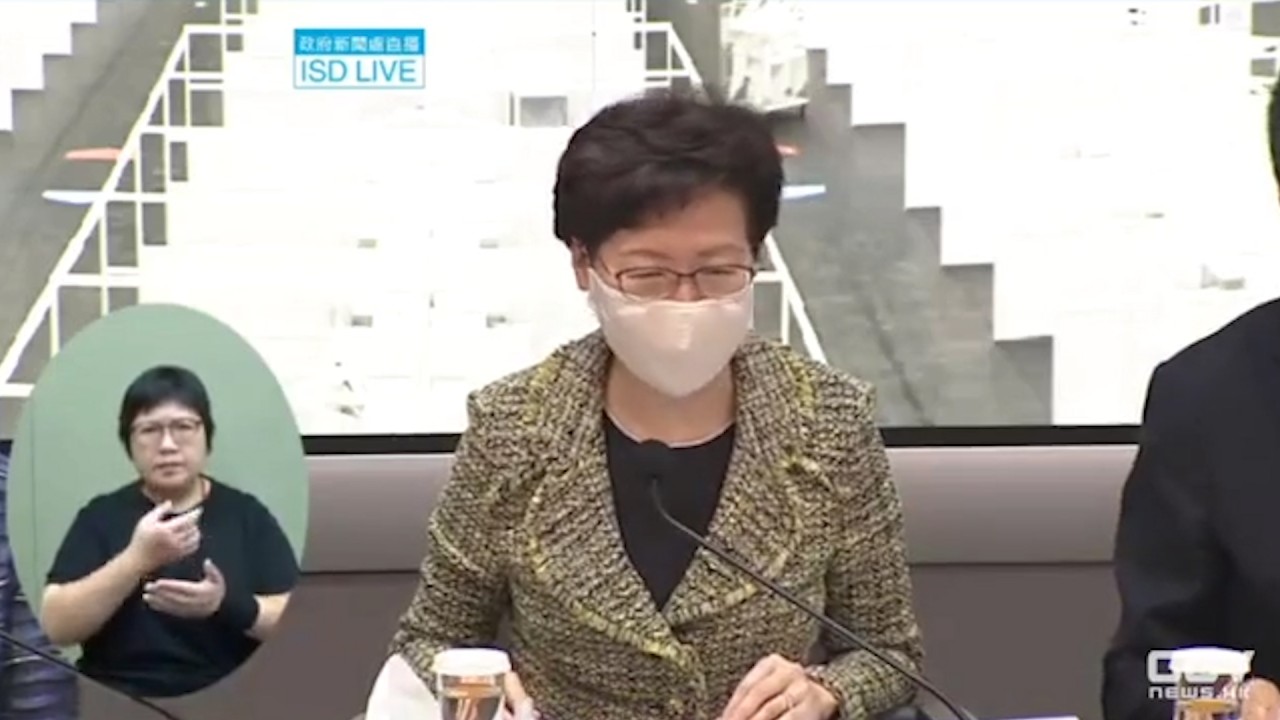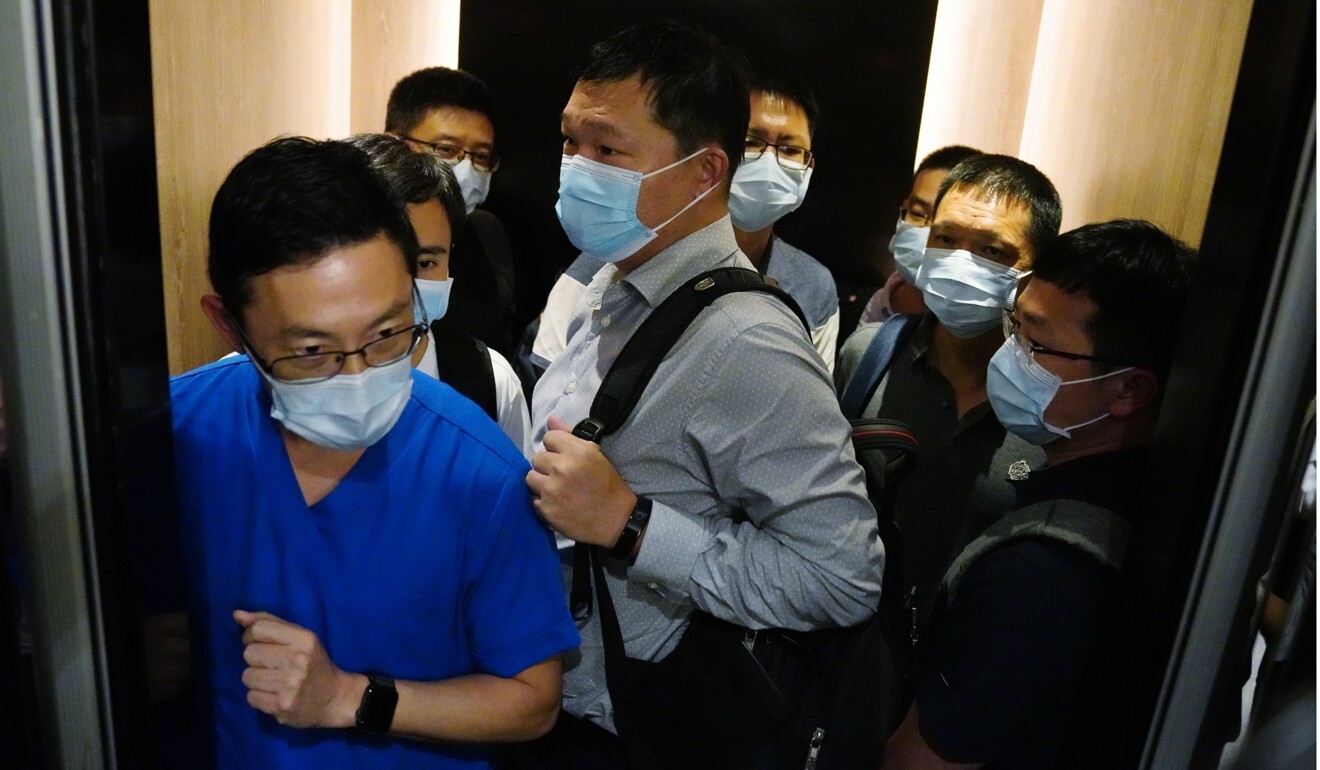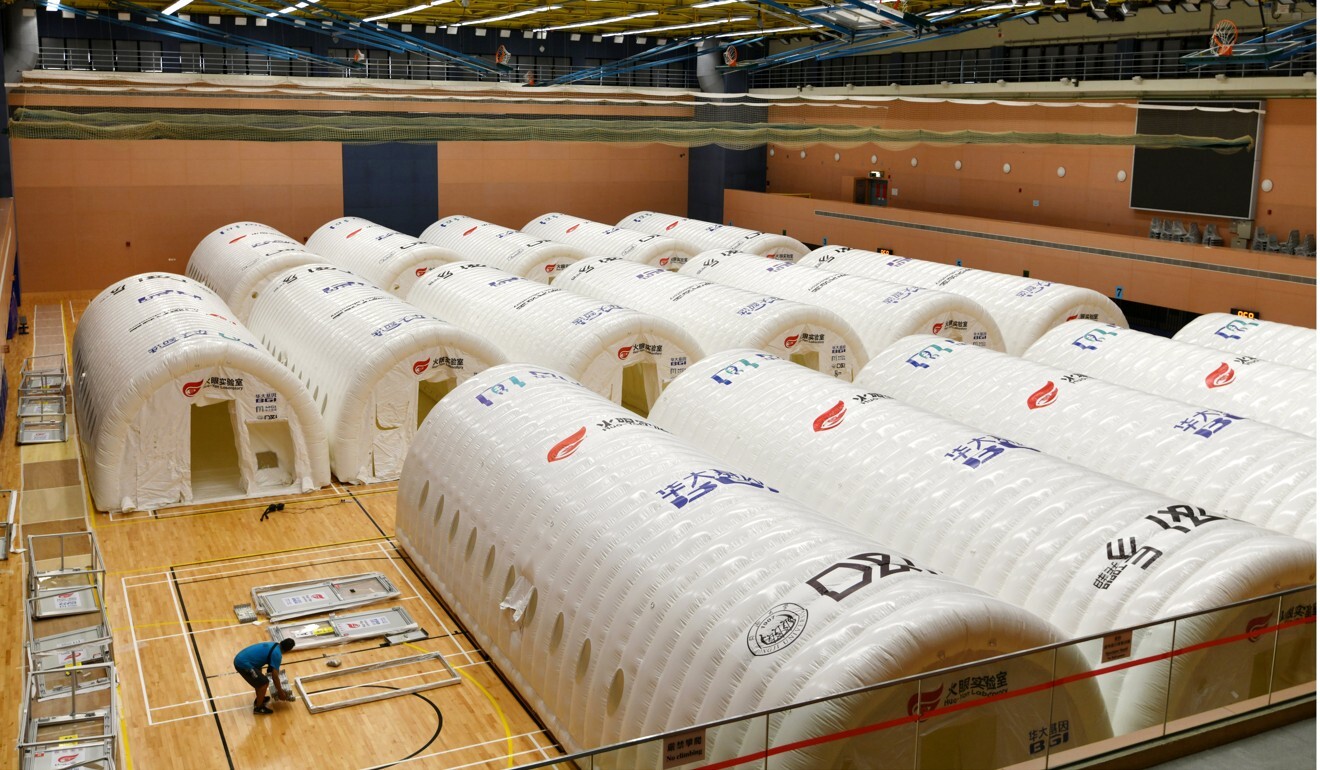
Hong Kong third wave: why mainland China’s help in fighting Covid-19 has sparked anxiety rather than appreciation
- Team dispatched from mainland will help with universal coronavirus testing and the design and development of at least two makeshift hospitals
- Administration’s failure to provide any concrete plans on how the mainland help will be channelled has helped fuel apprehension, analysts say
The team, with another 60 members to follow later, was dispatched to Hong Kong to help with universal testing and to design and develop at least two makeshift hospitals to relieve the strains showing in the overburdened health care system, reeling from 3,938 cases so far, including 47 deaths.
The universal tests, which will be voluntary and ready in two weeks’ time, will be run with the help of a team of medical experts from mainland China and private laboratories.

02:55
Carrie Lam announces free Covid-19 testing for residents in Hong Kong
In the lead-up to the announcement – shrouded in secrecy that fuelled speculation, said critics – the government found itself in a tight spot, being criticised by all sides.
Opposition politicians warned of the risks of personal and DNA data being transferred to the mainland authorities while Lam’s own team of local experts resisted the idea of conducting universal testing, saying it was neither cost-effective nor necessary when the focus should be on vulnerable groups.
In an attempt to address privacy concerns in the community, Lam pledged that the identities of those who were tested would not be revealed to the laboratories.
Massive voluntary programme to give Hong Kong public Covid-19 testing option
“I hope society can stop all kinds of conspiracies, defaming, smearing and creating conflicts, and should not undermine the relationships between the central government and Hong Kong, especially as it was the [city] government that sought the mainland’s help this time,” the chief executive said.
“I particularly hope the relationship between the central government and Hong Kong won’t be damaged.”
She said with the mainland’s help, the government would expand community treatment facilities at the AsiaWorld-Expo exhibition centre and at a site next to it, providing up to 2,000 beds. At the same time, three mainland-linked laboratories would work with the experts from across the border to increase the capacity for universal tests.

On paper, the request for help – which became public knowledge late last month – and the response from the mainland looked innocuous and generous. In pictures, smiles and handshakes when the first team arrived last Sunday suggested things were off to a peaceful start.
But the cordial atmosphere of a welcoming reception hosted by the government was in stark contrast to protests staged by localist district councillors on Wednesday outside a Yau Ma Tei hotel where the mainland team stayed.
Similar scenes took place on Friday, when the government revealed it planned to build a temporary lab at a local park for the mainland experts to carry out coronavirus tests. A group of opposition district councillors showed up to protest.
I hope society can stop all kinds of conspiracies … especially as it was the [city] government that sought the mainland’s help this time
But others also pointed to the administration’s failure to provide any concrete plans on how the mainland help would be channelled, adding the lack of information was fuelling the confusion and apprehension.
Professor Ray Yep Kin-man, a political scientist at City University, said the government was to blame for not providing enough information to the public.
“The government did not bother to tell the media the activities of the mainland team helping to boost testing capacity,” he said.
“The government naming the temporary hospital to be built next to the Asia World-Expo as the Hong Kong version of Wuhan’s Huoshenshan Hospital, a makeshift medical facility for those infected with the coronavirus, only makes some Hongkongers uncomfortable.
“It reinforces the perception of some Hongkongers that the government is trying to please the mainland authorities.”

But Lau Siu-kai, vice-president of semi-official think tank the Chinese Association of Hong Kong and Macau Studies, said the government should just ignore these “minor voices that always object”.
Instead, he suggested the government provide examples of the success of mainland help elsewhere.
“China has been very successful in building these temporary hospitals at high speed. The government should take note of that and inform the public with these details and examples,” he said.
‘Dorms put helpers at risk’ as second worker tests positive for Covid-19
Complicating the situation was also the reaction of local medical professionals, who questioned whether the experts would meet the same standards expected in the city. For example, they would have to be registered as medical laboratory technologists, some said.
On Wednesday, lay members of the Hong Kong Medical Council issued a statement, calling for doctors, nurses or medical laboratory technologists from the mainland to register according to existing procedures before they could help the city.
At her press conference on Friday, Lam said the experts would be exempted from the 14-day quarantine and also did not need to undergo prior registration.
“Let me just stress that these personnel coming to help us to boost the testing capacity are not unqualified people,” she said.
“So please don’t misunderstand they are unqualified people to do medical laboratory tests and we are making them qualified. No, they are qualified in the mainland system but they want to operate in accordance with the Hong Kong legal system, so our law does provide for the exemption for certain categories of people.”
But the sceptics were not reassured. Alex Lam Chi-yau, one of the council’s lay members, said: “The public has little information about the three private laboratories involved, while these mainland experts could go through established regulations to register, but the government chose not to do it.
“It is inevitable the public will have doubts about the reliability and security of testing, and the doubts could hardly go away. We are different from the mainland as we have our rules and practices.”

Lam described fears over people’s data being taken to the mainland as “conspiracies” and “rumours” that had prompted her to hold her press conference earlier when originally her government was going to outline a more detailed plan in the coming week.
Hospital Authority chairman Henry Fan Hung-ling also dismissed the rumours as unwarranted and said the mainland help would speed up testing.
“They should be welcomed with open arms. There is no talk of their medical team coming in to administer any medical treatment,” Fan said.
After Lam asked for mainland help in late July as Hong Kong suffered 12 straight days of triple-digit Covid-19 infections, the Hong Kong Macau and Affairs Office issued a statement confirming her request.
Protests, pandemic playing havoc with mental health in Hong Kong: study
A news report by state broadcaster CCTV soon followed on August 1, suggesting that all 7.5 million Hong Kong residents would receive free virus testing with mainland help, similar to how 11 million people were tested in just two weeks in Wuhan, ground zero of the virus outbreak in China.
But when the seven-member mainland team arrived, with few details revealed, speculation mounted.
“The public is not sure what these experts will do, thus raising concerns over whether people’s data will be leaked, and why they are allowed to stay in the city,” Chinese University political scientist Ivan Choy Chi-keung said.
“The government did not explain at all about how to cope with the differences in culture and regulations.”.
It was not surprising, therefore, to have opposition legislators and district councillors take up the cudgels against the move.
Should Hongkongers be worried by wet market Covid-19 clusters?
Roy Tam Hoi-pong, a district councillor from the Neo Democrats who joined the protest, said he was opposed to having mainland scientists in Hong Kong as the city’s advanced medical industry could cope.
Li Xiaobing, a Hong Kong specialist and law professor at Nankai University in Tianjin, believed the reservations among certain quarters in Hong Kong reflected the differences in the systems between the city and the mainland.
“The reservations [over data] can partly be attributable to the anti-mainland sentiments among some people in Hong Kong,” he said.
“This is just disturbing noise, and I’m confident that the central government will have the patience to win the support of Hong Kong people in working together to battle the pandemic.
“What is important is for the mainland teams sent to Hong Kong to show their professional qualities and transparently do their jobs.”
Professor David Hui Shu-cheong, one of the government’s advisers on the pandemic, believed the mainland offer was not to be refused.
“As advisers, we offer public health advice to the government, while these mainland experts have experience building temporary hospitals at high speed and can give technical advice on mass testing. We have different roles,” he said.


